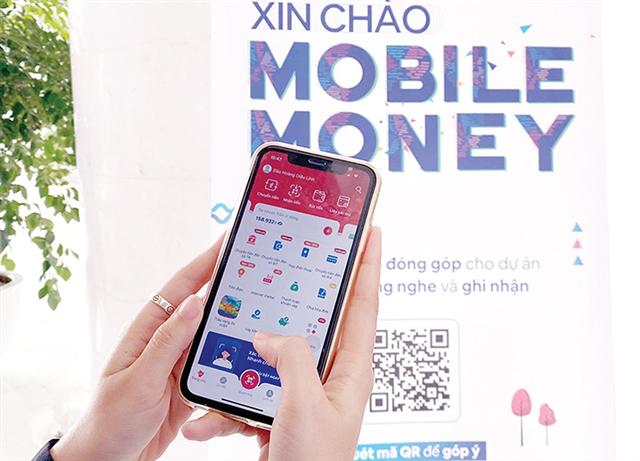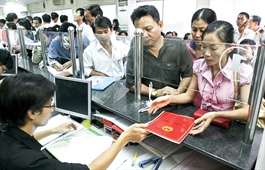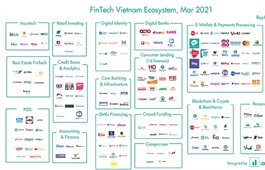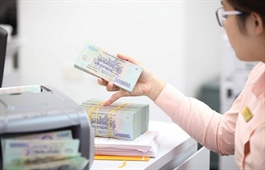Mobile money attempts to topple classic banking
Mobile money attempts to topple classic banking
The newly-launched mobile money pilot programme is expected to heat up competition for domestic players but also open collaboration opportunities to cash in on the niche market.

Mobile money apps are presenting consumers with much more streamlined options for their banking needs. Photo: Le Toan
|
Since mobile money is still in its concept stage, Vietnamese telecom behemoths Viettel, VinaPhone, and MobiFone are quickly preparing the necessary infrastructure to roll out services once being greenlit by the authorities. The companies are making efforts to break into the new segment as the traditional market has been saturated – and their entrance is expected to create fierce competition while also placing pressure on banks that utilise more established payment methods.
Vietnam has witnessed a booming e-wallet business in the past few years. According to the latest research by Cimigo, MoMo, Moca, and ZaloPay are the top three most popular e-wallets in the two main cities in Vietnam, accounting for more than 90 per cent of the e-wallet market.
In the beginning of 2021, MoMo raised at least $100 million from six global investors. Meanwhile, VNPay has become the second unicorn startup in Vietnam and one of 12 companies in Southeast Asia with a valuation of $1 billion. Other apps have also recorded impressive growth.
Marcin Miller, associate partner of McKinsey Vietnam, told VIR that mobile money’s could impact the payment market on several levels – first is smartphone penetration, and second is the banking distribution network.
That said, there are other methods of cashless payments that are widely available in Vietnam. The pilot will nevertheless help to confirm whether this form of payments resonates with groups that do not have bank accounts or are not already using e-wallets or other cashless payment methods.
Truong Cam Thanh, director of ZaloPay, said it is inevitable for the competition between mobile money service providers and e-wallets to grab a share of consumer wallets.
However, each player has their strategy, market, and consumer target. “Mobile money can grow well in remote and rural areas while e-wallet apps will be more popular in urban cities,” he said.
Meanwhile, Ngo Trung Linh, general director of VietUnion – the development unit of e-wallet Payoo – said the firm is partnering with other telecom providers to provide mobile top-up services.
Transforming the market
Some experts also argue that the pilot programme likely puts pressure on traditional banks so they need to step up their game to maintain their market share. As telecom providers are likely to re-establish competitive fees leading to more people opening mobile accounts for payments, the earnings of banks can shrink significantly.
However, McKinsey’s Miller stated that traditional banks still have ample room to play and innovate, as the mobile money programme offers new complementary assets that traditional banks can leverage.
Through partnerships with telco players, banks can introduce new products – such as a top-up services for mobile money wallets – and target new user groups, enabling them to transition mobile money users to fully banked clients. “Mobile money cannot replace a full banking offer. Instead it can be an attractive payment method for specific groups of clients,” Miller said.
According to Riddhi Dutta, regional director for ASEAN and South Asia at Netherlands-based digital-first banking provider Backbase, Vietnam has a high growth potential and the country remains in the early stages of development for a fintech framework. “It is imperative that local firms work with foreign investors and enterprises to access the technology, experience, and capital they need,” Dutta said.
With core banking and payment system modernisation being the top priorities among banks, fintechs can take this opportunity to enter the market and partner local banks and enterprises to help scale their innovations.
The partnerships will also allow financial enterprises and banks to embrace the new technology offerings through their new fintech partners to achieve value-creating collaboration, according to Dutta.
Cracking the market
Besides the vast opportunities, there are a number of potential issues for the fledging services. According to a report by the BIDV Training and Research Institute, disposable SIM cards are the most difficult problems for customer identification.
With mobile money, each customer is only allowed to open one primary SIM payment account at one carrier. However, disposable SIM cards are still available in many transaction points despite the effort to curb this problem.
Thus, if the management of disposable SIM cards along with anonymous transactions are not strictly implemented, mobile money could become a channel for laundering and fraud.
There are also other risks like infringement of customer data, security risks, gambling, and others. For service providers entering the mobile money pilot programme, the Backbase representative suggested businesses should provide greater levels of convenience, overcome financial literacy challenges, and improve accessibility to meet the needs of the unbanked and underbanked population.
“It is crucial for them to adopt a customer-first mindset and approach to ensure a successful adoption of their digital platforms,” Dutta explained.
“Choosing the right fintech partner is also essential to ensure these digital banking platforms are resilient and survive the test of time over the next 15 years. These partnerships will only be beneficial when working with the same vision, commitment, and appropriate technology to address the needs of customers,” he said.




























